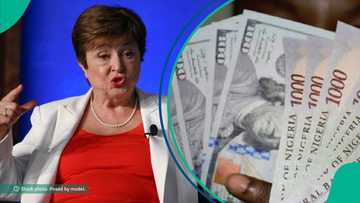Nigeria’s Total Debt Profile Rises to N134 Trillion amid Tinubu’s New Borrowings
- Nigeria’s total debt stock has risen amid recent borrowings by the federal government under President Bola Tinubu
- The country’s total debt profile has risen by N12.6 trillion in the first three months of 2024 to N134.3 trillion from N1217 trillion
- The Nigerian government disclosed that the new debt stock is due to the naira devaluation
Do not miss an opportunity to join FREE webinar by Legit.ng. AI in Action: Practical Skills for Creative Professionals. Register here!
Legit.ng’s Pascal Oparada has reported on tech, energy, stocks, investment and the economy for over a decade.
Nigeria’s total debt profile spiked by N12.6 trillion in three months to N134.3 trillion towards the end of the second quarter 2024.
The increase is 10.35% from the N121.7 trillion recorded in the first quarter 2024.

Source: Facebook
The document shows Nigeria’a current debt stock
An official document presented at a session on the sidelines of the World Bank/IMF annual meetings in Washington, DC, shows that the spike was due to the naira devaluation.

Read also
Banks, dealers adjust exchange rates as dollar crashes in official window, FX reserves rise
PAY ATTENTION: Legit.ng Needs Your Help! Take our Survey Now and See Improvements at LEGIT.NG Tomorrow
According to the document, debt stock rose in naira terms to N134.3 trillion in Q1 2024, caused by exchange rate devaluation, stating that the dollar amount remained unchanged.
While Nigeria's debt is reducing in dollar terms, there was an increase of N5.55 trillion or 8.45% in domestic debt, up from N65.65 trillion in the first quarter of 2024 to N71.2 trillion in the second quarter of this year.
Additionally, external borrowing increased by $780 million from $42.12 billion in the first quarter of this year to $42.9 billion by June 2024.
Domestic debt continues to grow
The Punch reports that the debt document indicated that domestic debt continued to dominate the country’s public debt portfolio in the second quarter of 2024, representing 53% of the entire debt stock at N71.2 trillion.
External debt comprises 45%, amounting to N63.1 trillion.
The report also showed that Nigeria’s debt-to-GDP ratio has exceeded the 50% ceiling.
It also showed that the FGN Bonds represent 78% of the domestic debt, indicating the government’s reliance on local bond markets for financing.
Punch reports that other domestic instruments show a diverse browning plan, including Nigerian Treasury Bills, Savings Bonds, Sukuk, Promissory Notes, and Green Bonds.
Regarding external debt, multilateral loans represented 50.4% of the total external debt, showing the country’s appetite for financing from international bodies such as the World Bank and the African Development Bank (AfDB).
Nigeria’s domestic dollar bond achieves 100% success
Bilateral loans comprise 13.7%, while commercial loans represent 35.9% of external debt.
The Minister of Finance and Coordinating Minister of the Economy, Wale Edun, said Nigeria’s $500 million domestic bond was oversubscribed and raised over $900 million from investors.
This feat comes despite previous advice from the International Monetary Fund (IMF) regarding bond issuance.
The Nigerian government launched the domestic dollar bond on August 15, 2024, with subscriptions opening at $1,000 per unit five days later.
The minister said that the IMF discouraged the government from issuing bonds. However, the country went ahead and achieved 100% oversubscription.
FG gives update on debt servicing payment
He acknowledged the IMF’s role in providing concessional loans, funding, and technical support to countries, stating that the institutions help to shape domestic policies and boost economic blueprints.
Legit.ng’s previous report shows Nigeria has paid $700 million in debt services. He disclosed this when he appeared before the Senate committee on appropriation over the budgets' performances on Wednesday, July 3, 2024.
According to Edun, the debt service payment was for 420 national development agencies and others, Punch reports.
The finance minister also provided an update on the ongoing forensic investigation into the N30 trillion Ways and Means.

Read also
Dealers quote new prices for cooking gas as costs skyrocket by 114% since Tinubu’s presidency
FG speaks on ending Central Bank's borrowing
Legit.ng earlier reported that the federal government has formally stopped using the Central Bank of Nigeria's (CBN) Ways and Means facility to pay its obligations.
The minister of finance and coordinating minister of the economy, Wale Edun, stated this at the 2024 Access Corporate Forum, themed ‘Nigeria’s Economic Rebirth: Hopes and Implications.
Edun's remarks follow the CBN's announcement that it would continue to limit its Ways and Means advances to the federal government to 5% for the fiscal year 2024–2025. Budget gaps have previously been filled with this facility.
Proofread by Kola Muhammed, journalist and copyeditor at Legit.ng
PAY ATTENTION: Сheck out news that is picked exactly for YOU ➡️ find the “Recommended for you” block on the home page and enjoy!
Source: Legit.ng




